Eric Carter, Squamish ultrarunning alpine adventurer
From Nordic skiing to trail running to ski mountaineering, Eric Carter is made for outdoor adventures
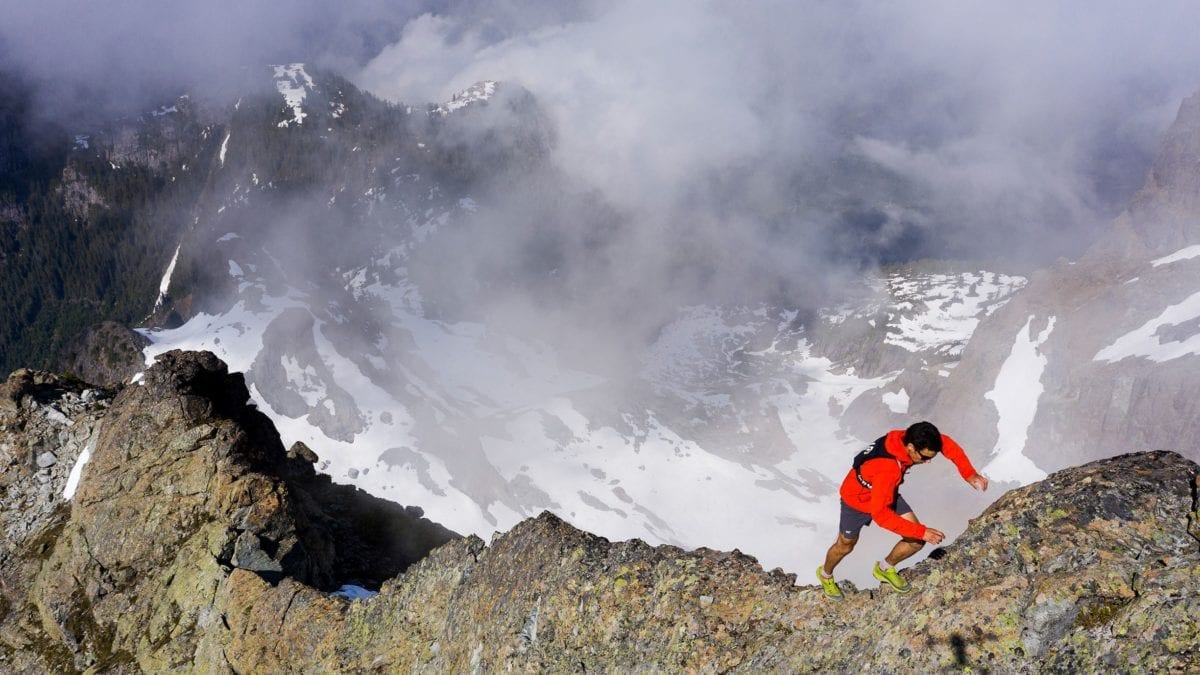 Photo by:
Chris Christie
Photo by:
Chris Christie
When Eric Carter, an ultra-runner from Squamish, B.C., and ultrarunning legend Adam Campbell traversed the top ridge of Grotto Mountain in the Rockies near Canmore, Alta., they had already covered 50K, 5,000 vertical metres and four technical climbs steep enough to warrant the use of a rope. The running had been steep, technical and relentless.
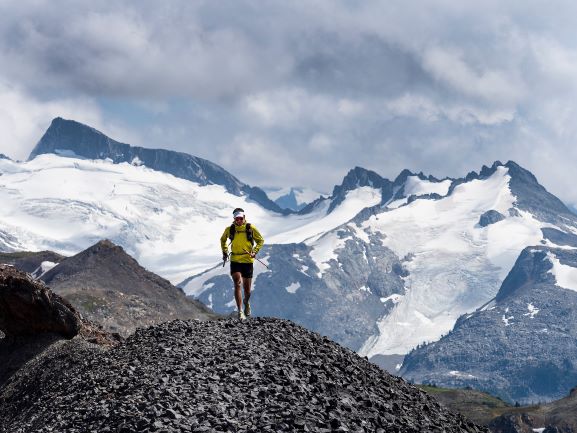
To the west were the other three mountains of the Canmore Quad Challenge: Ha Ling, Mount Lady Macdonald and EEOR (The east end of Mount Rundle). Nature rewarded them with an awesome spectacle. “We had perfect weather,” says Campbell. “We watched a tornado and lightning storm roll over Calgary and the Prairies as we traversed Grotto as the full moon was rising. It was an unreal end to the day.”
RELATED: Training and goals for trail runners during COVID-19
The Fastest Known Time (FKT) on the regular version of the challenge had been set the day before by Leif Godberson in 7:48, a time Carter calls “outrageous.” Carter and Campbell took 18 hours, but their route combined technical climbing routes and running. Their time was 18 hours and 30 minutes.
Campbell, who was originally from B.C. and is now based in Canmore, is well known to the running community. At 33, Carter is just beginning to make his mark in Canadian ultrarunning and fast and light alpine adventures.
Carter was born in Minnesota, where he was a competitive Nordic skier. His running career began when he would cross-train on trails. When he moved to Burlington, Vt., for university, he was on the college skiing team, and the beautiful Green Mountain trails stoked his passion for trail running.
RELATED: Ultrarunner sets FKT on 1,200-mile Ice Age Trail
After his undergraduate degree, Carter decided to move to Squamish and pursue graduate work in kinesiology. “I came to Squamish because I knew there were mountains,” says Carter. “I commuted three days a week to Vancouver for school.” Eleven years later, Carter is still in Squamish, and having completed both a masters and PhD, he now co-owns Ridgeline Athletics with ultrarunning champion Gary Robbins. “But I’m pretty much taking a year off from school to do the athlete thing,” says Carter.
Carter is an all-around mountain endurance athlete who climbs (to keep up his skills for technical terrain on runs, but also for its own sake), does brutal mountain runs and is a successful competitive ski mountaineer. “I got into backcountry skiing,” Carter says, “and then tried to do it faster. When I realized there were races where you could do it more efficiently, my competitive spirit kicked in.” In 2015, he was the top-ranked American in the sport, and now he races about 30 times a year.
Around Squamish, Carter’s running partners were local athletes Nick Elson, Campbell and Robbins, at least until Robbins moved to Chilliwack, B.C. He has also added Jessie McCauley and Brendan Armstrong to his list of companions on the trail.
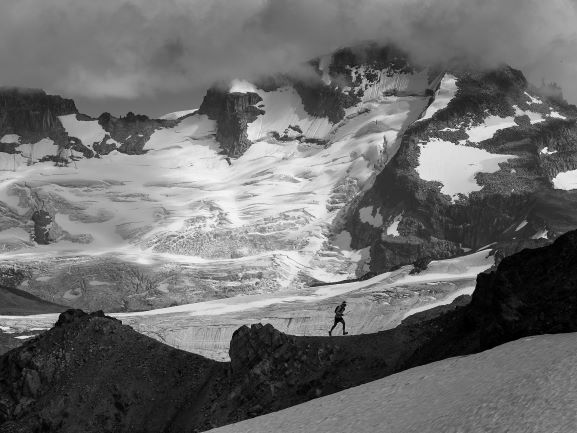
“Summer is more about personal projects and adventures,” says Carter, but he has also runs in most of the local trail races. “I like vertical kilometres,” he says, “so I jump at those. I’ve done some 50K races and some other ultras. Gary Robbins’s races are great. The Rubble Creek Classic, [a 25K with 1,000 m of elevation gain] was a classic.”
RELATED: 6 reasons to become a trail runner
Carter also loves to challenge himself to run FKTs and to improve his times on local runs like the path to the top of the Stawamus Chief, which he has run in the low 18s (the FKT, by Alexandre Ricard is 17:19, which topped Elson’s record of 17:35.) Carter, Elson and friends have also taken fitness, speed and skills honed around Squamish to some local alpine objectives, a useful passion in the year of COVID-19 and restricted travel. “My plans for more racing were definitely shaken up,” says Carter. “Luckily, living in B.C. there is no shortage of cool stuff to do and one of the coolest places is the Tantalus Range.”
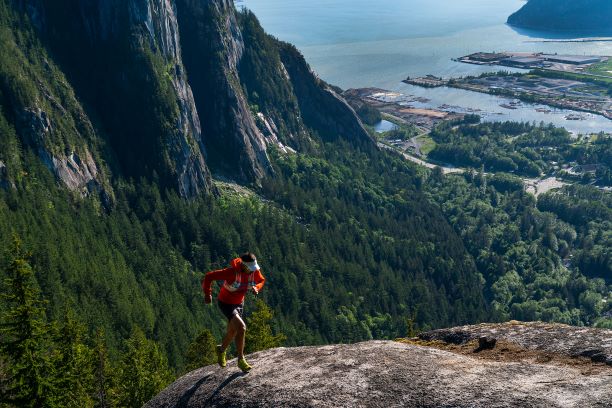
On his obsession with moving fast, Carter says, “I believe that, for myself, the interest stems from my time as a competitive Nordic skier but also from a deep desire to sleep in my own comfortable bed each night.”
The Tantalus range in southern B.C. is a 35K-long alpine range up to 8,540 m. Carter holds a number of FKTs in the range, including the Tantalus Traverse (Pelion, Tantalus, Dione, Serratus, Alpha, Sigurd Creek to LLW Trailhead) with Greg Hill and Ross Berg in 18 hours. Elsewhere, in the Garibaldi range, also in southern B.C., he holds the FKT for the Garibaldi Lake Circumnavigation (from Rubble Creek Trailhead) with Elson in 12:08:23, although he acknowledges that the previous record holder, Canadian climbing star Peter Croft did his version “using a direct line up the Sphinx North Ridge, so he did it in better style.”
RELATED: Gary Robbins’ Coast Mountain Trail Series cancels spring and summer events
Asked about the risks of taking running into the alpine, Carter is thoughtful. “I’ve had no close calls with objective hazards like rockfall. I have been lucky so far. It’s a really interesting topic, the risk and the probability versus consequence.”
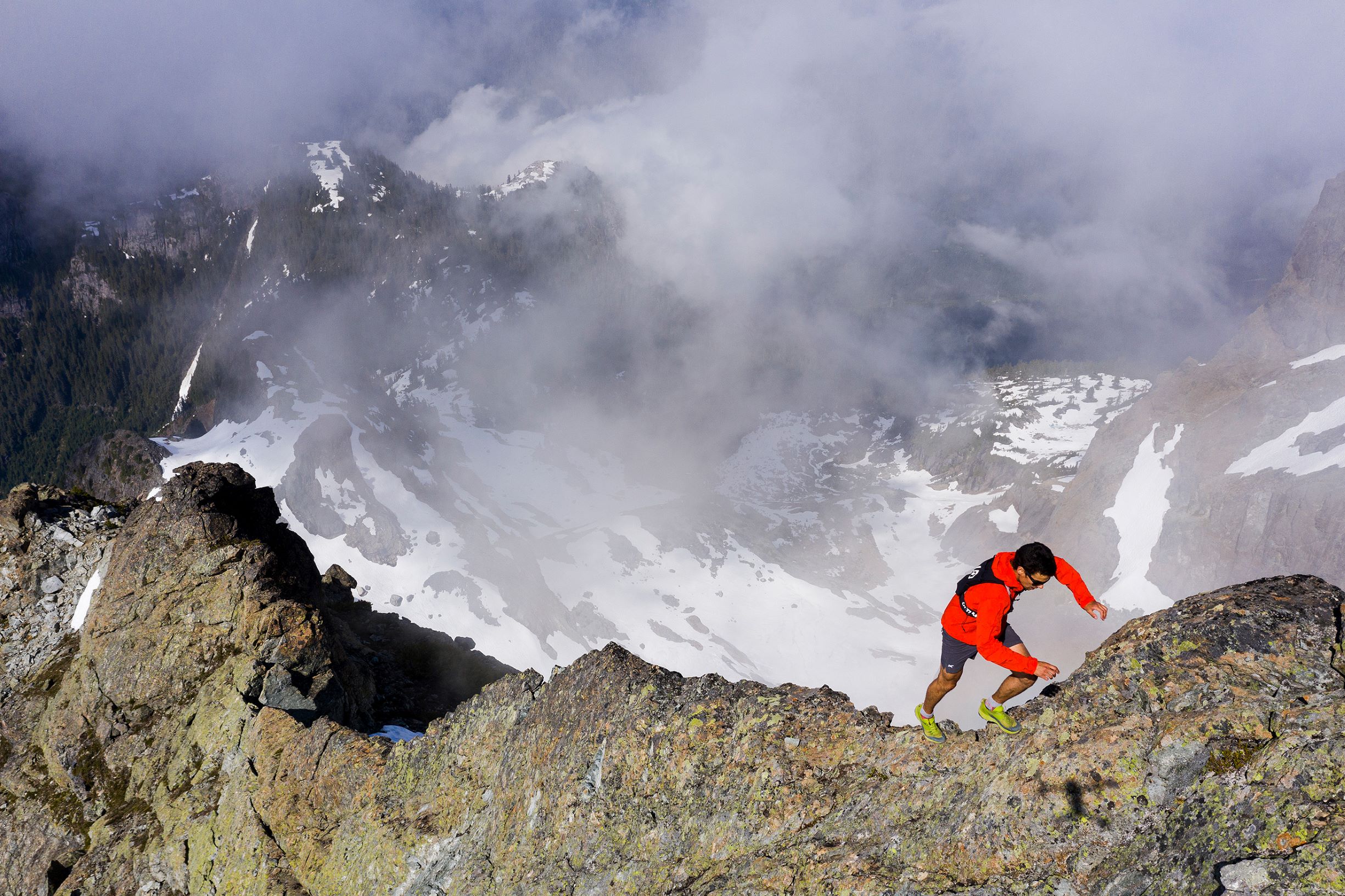
His advice to those who would take fast and light running to the mountains is to think about “skill and recognizing your limitations. We talk about it a lot. Stuff we succeed on gets talked about, but the 10 days we failed don’t get reported. On the Canmore Quad, for instance, the first day we tried it, it started to sprinkle in the morning and the skies looked foreboding. We pulled the plug, went back the next day. We’re really willing to call the day. When you cut margins by carrying less equipment, you have to increase your safety margin elsewhere, and that’s by having a much smaller tolerance for inclement weather.”
There are sure to be more adventures in B.C. and the Rockies this year, although there won’t be much international travel this season. In between adventures, Carter will be found on his new paddleboard, cruising around Howe Sound. “As a climber and runner,” he says, “you almost forget about water, but stand-up paddleboarding is a really good recovery method and adds some variety. Plus lots of ducks.”


